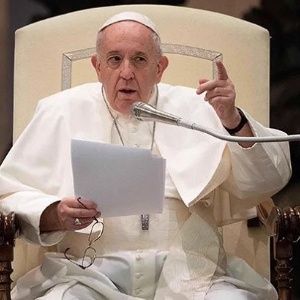On Wednesday, Pope Francis arrived in Lisbon to participate in World Youth Day (WYD) and meet with Portuguese President Marcelo Rebelo de Sousa.
During a speech at the Belem cultural center, he lamented that the European countries do not offer “creative ways” to end the military conflict between Russia and Ukraine.
The Argentine Pope also stressed the need to respect the original mission of the European Union (EU).
In front of the authorities, diplomatic corps and members of civil society, Francis recalled that the 2007 reform of the European Union states that this integration bloc “has the purpose of promoting peace, its values and the well-being of its peoples.”
The Lisbon Treaty goes further “by stating that in its relations with the rest of the world… it will contribute to peace, security, sustainable development of the planet, solidarity and mutual respect among peoples, free trade and justice, the eradication of poverty, and the protection of human rights,” Francis recalled.
Europe’s original mission was “to open paths for dialogue and inclusion, developing a peace diplomacy that extinguishes conflicts and alleviates tensions, capable of capturing the slightest signs of détente and reading between the most crooked lines,” he added.
Pope Francis then asked Europe, “Where are you sailing, if you do not offer peace processes, creative paths to end the war in Ukraine and so many conflicts that bloody the world?”



If beaten in Ukraine, there is a chance that the trajectory of the Russian Federation changes. Currently they are trying to fulfill a senseless imperial project which is doomed to eventually fail.
With defeat in Ukraine, there’s a chance that the growing destabilization within Russia leads to abandonment of the imperial dream. It might also force a change in the leadership albeit not necessarily for the better. What it would do however, is to show that the Putinist system is not the only option and that the actions it has taken, are in fact harmful for Russia and Russians. In a way, it opens up a way to politicize the apolitical Russian public.
In the semi long/long term this would benefit the population as it would not only challenge the idea of Russia as an Empire, but also allow for a less authoritarian model of governance.
I think it’s a little too hard to predict what will end up better for the Russian people. As you say, there’s no guarantee that a post-Putin Russia is necessarily a better one. But there are many paths that lead to a more democratic and free Russia, and many that may emerge from any outcome of the war.
Sure. One thing is pretty certain though: thing won’t be getting better under the current regime.